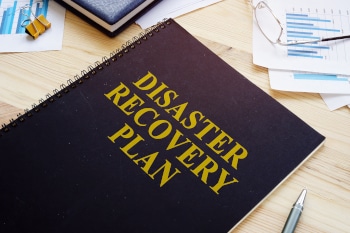Why Disaster Recovery is More Important Than Ever

1. Cyber Crime
Every employee is a potential entry point for viruses, malware, hackers, and ransomware attacks. Lower this risk with a secure WiFi router, enabled firewalls, strong passwords that are changed frequently, current antivirus software, and consider using a Virtual Private Network (VPN). Avoid unsecure websites and apps. Train staff to recognize phishing emails. Even with all of that in place, a cyberattack of some kind is still possible, so be prepared with a disaster recovery plan.
2. Natural Disasters
A storm, fire, flood, hurricane, or tornado can create extreme havoc for your business. Having a disaster recovery plan in place is vital to resuming operations as soon as possible. If you can’t recover very quickly, the future of your business may be very short. Many businesses never entirely recover from a disaster, losing orders, contracts, key employees, or filing for bankruptcy. A disaster recovery plan will improve your likelihood of staying in business.
3. Hardware Failure
If your hardware fails, it is likely taking your data down with it. Surge protectors, good cooling systems, and the best technology will help prevent early failure, but failure will happen sooner or later. When that happens, data backups are essential to minimizing recovery time. Backups are further protected when they are off-site, like cloud-based storage or a records management company.
4. Human Error
If it weren’t for humans, this wouldn’t even be on the list. But staff will make mistakes, like not saving changes, accidental deletion, or overwriting. Hiring great staff and keeping them trained will narrow the gap on human error, but regular backups will protect against the inevitable.
If a shutdown or interruption occurs because of one of these unfortunate events, you need to have a disaster recovery plan in place so your customers can be confident they will continue to receive quality service from your business and won’t be tempted to rush off to your competitor. Here are some tips for creating a recovery plan:
- Write Out the Plan. Itemize, in order of importance, what should happen so there’s no scrambling or missed steps and no time is wasted. Be transparent as possible with your customers.
- Make a Communication Plan. How will the staff communicate, especially if primary communication (email, phone) is inaccessible? The more options for keeping the communication lines open, the better.
- Automate Backups. Having both cloud and physical backups done automatically, and physical backup media stored in a media vault with regular rotation, ensures you will always have the most recent data, and will eliminate the potential of backups not being done due to human error.
- Remote Access Enabled. This allows your staff to keep working should they not be able to get into their office.
- Keep Network Maps Up to Date. A copy of the company’s network of software, data, systems, and hardware will help your IT team get you back up and running quickly.
- Maintain and Update Hardware and Software. Everything has a lifecycle and being proactive will help minimize deteriorated hardware, out-of-date software, security holes, glitches, and cyber-attacks. Replace and repair early.
- Store Paper Records Off-Site. Keeping your files in an off-site records center provides a secure environment, minimizes the risk of security breaches, protects against natural disasters, and offers an additional backup system for both archival records and active files.
Pacific Records Management is PRISM Privacy+ Certified, NAID AAA Certified, and HIPAA, FACTA, SOX and GLB compliant. We offer off-site records management to help you get back up and running in the event of a disaster. Include us in your Disaster Recovery Plan by giving us a call at 800-685-9034 or complete the form on this page.
